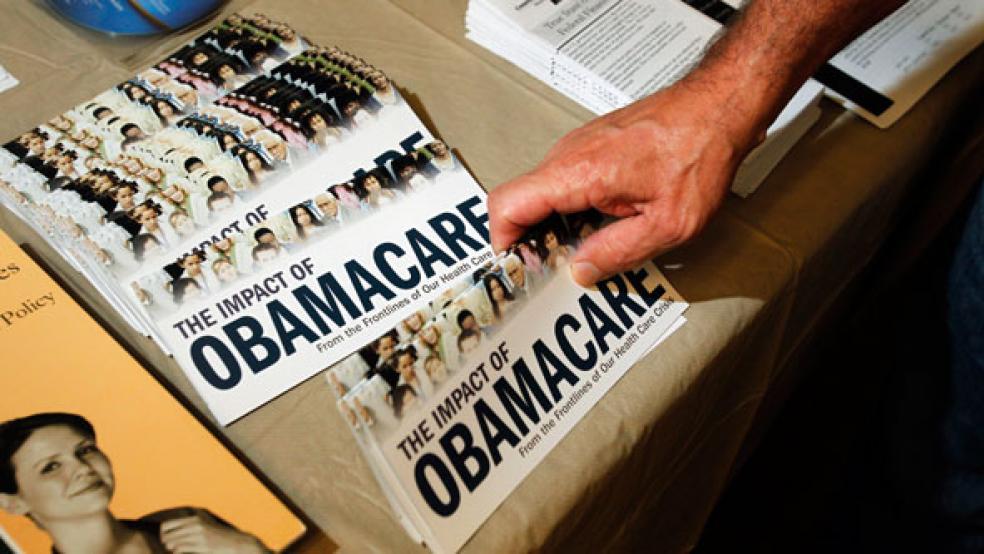One month ago, Democratic Party strategists told Politico that the Affordable Care Act (ACA), otherwise known as Obamacare, would prove to be a political winner for Democratic incumbents. “In 2010, the benefits of ACA were theoretical and Democratic candidates ran away from it,” one anonymous senior party official told Alex Isenstadt. “In 2014, Democrats can talk about the positives, position themselves as consumer advocates to make it work and go on offense against Republicans for wanting to take the benefits away.”

So much for running on “the positives” of Obamacare. This week, the White House announced it will now delay a key part of the ACA – a requirement for employers of 50 or more to provide health insurance to full-time employees. Instead of going into effect on January 1 of next year, the Obama administration will postpone enforcement of the mandate to January 1 2015. Not coincidentally, that comes “after the congressional elections,” Bloomberg helpfully notes in its report.
RELATED: UNRAVEL OBAMACARE AND YOU GET A TRAINWRECK
The employer mandate drew massive resistance as the original implementation date drew nearer. Businesses began to experiment with transforming employees to part-time status to avoid the costs associated with the ACA’s coverage requirements. Thanks to the impact of mandates on insurers, employers also had to figure out how to handle large increases in premiums this year. The reprieve postpones the inevitable, but employers are happy for any breathing space they can get. The National Retail Federation called the delay “an unexpected but extraordinarily wise decision.”
However, the problem with this “wise decision” is that it favors businesses over individuals, and the two are not unrelated. The employer mandate exists in the bill to limit the number of people that taxpayers will have to subsidize for purchases in the new Obamacare exchanges. Without the tax penalties of the employer mandate, employers would eventually rid themselves of the coverage headache, which would make millions more workers than anticipated eligible for subsidies, transferring the costs from companies to taxpayers. This mandate goes hand in hand with the individual mandate – which pointedly remains in place, with its tax penalties for uninsured and underinsured Americans, to be enforced on schedule.
This creates a second political problem for Barack Obama and his party. Even if the business mandate gets postponed, voters will have to experience the price shock of higher premium rates, after being told that they could expect to see cuts in premiums of up to $2500 per family. The entire need for the ACA was to “bend the cost curve downward” and to rein in the big insurance companies on behalf of the struggling middle class. Instead, the White House proposes to exempt corporate America for at least a year from the burden of compliance while the IRS demands compliance from the middle- and working-class families that will have to struggle to pay higher premiums, starting in January.
So much for the promises of populism!
The worst problem, however, is the one-year waiver itself. Earlier, the Department of Health and Human Services issues a blizzard of waivers for insurance plans and employers to delay enforcement of coverage mandates. Critics charged that HHS was paying off friendly constituencies with their waivers, many of which went to unions, but HHS at least had the authority to issue them. Those coverage mandates came in the form of regulation promulgated by the department itself, under expansively broad authority granted to HHS by Congress as part of the ACA. Rather than taking the time to establish the requirements in statute, Congress punted the task to the executive branch – which gave the Obama administration plenty of room to arbitrarily enforce its own regulations.
RELATED: WHY THE IRS SCANDAL COULD BRING DOWN OBAMACARE
The employer mandate, however, isn’t an HHS regulation. As attorney and blogger Gabriel Malor explains, Congress specifically added the mandate on employers as statutory law, as well as the date by which non-compliance creates the tax penalty:
“Remember: these tax code changes create a monthly reporting requirement,” Malor explains. “And, ACA sec. 1513(d) provides explicitly when that monthly reporting requirement shall apply. “The amendments made by this section shall apply to months beginning after December 31, 2013." Contrary to several media reports, there is no discretion in the law about that December 31, 2013 date. The monthly reporting requirements apply "to months beginning after December 31, 2013," which includes all months in the year 2014.”
The White House cannot unilaterally refuse to enforce a statute Congress created and the President himself signed. Furthermore, Cato’s Michael Cannon and American Enterprise Institute analyst Tom Miller emphasize the link between the penalty and the rational working of the entire ACA.
“The IRS both delayed the imposition of penalties and “suspend[ed] reporting for 2014,” Cannon writes. “As the American Enterprise Institute’s Tom Miller observes, without that information on employers’ health benefits offerings, the federal government simply cannot determine who will be eligible for credits and subsidies. Without the credits and subsidies, the “rate shock” that workers experience will be much greater and/or many more workers will qualify for the unaffordability exemption from the individual mandate.”
Waiving one mandate without the other not only offends the rule of law, it completely disrupts the delicate fiscal scheme that Congress created to keep costs in line. Democrats used to complain about the “imperial Presidency” of George W. Bush when he acted completely within his constitutional authority. This demonstration is a much clearer example of an administration that manipulates law for its own political purposes, even laws demanded by President Obama himself.
Furthermore, the problem of an imperial Presidency doesn’t end with Obamacare. The White House has pushed the House to consider a comprehensive immigration-reform bill passed by the Senate last week, arguing in part that the bill provides for more border security than ever contemplated by any previous Congresses or administrations. A late amendment even transferred those border-security and visa-reform metrics from regulations to statutory requirements. Given how this White House treated the statutes created by the ACA it championed, why exactly should House Republicans put any trust in this administration to enforce the border-control statutes created by the Senate in its bill?
A recent Fox poll shows that distrust of the federal government has jumped nine points since last October, and now ties the peak seen in July 2011. Unlike the administration’s blatant attempt to escape the political consequences of its terrible health-care market reform, those results are neither capricious nor irrational.






